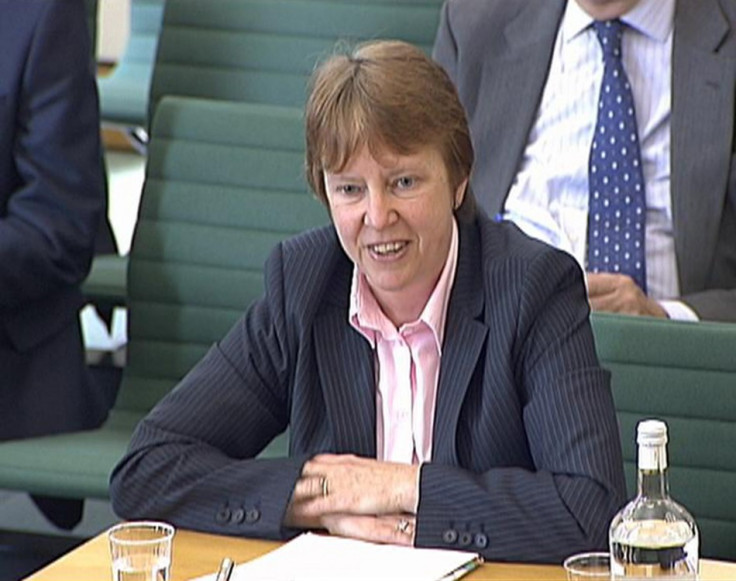Bank of England Governor Race: Kate Barker Should Top George's Osborne's List

George Osborne's choice for the next Bank of England Governor will define the future of the broadest challenge in its 300-year history, but his likely list of candidates is a sad reminder of the burdens of the past.
The final list of candidates to succeed Mervyn King, only one of two men to run the Bank since it was granted independence in 1997, will arrive on the Chancellor's desk this week. Bookies' favourite Paul Tucker, the Bank's current Deputy, will no doubt top the pile, with former CBI Chairman and career apparatchik Adair Tuner's file tucked just underneath.
Former Bank economist and current Office for Budget Responsibility Kate Barker's CV, it's assumed, sits on the Osborne's desk but likely in a distant corner.
More's the pity.
With an exhausting sense of the familiar, Osborne appears ready to narrow his choices by using the classic Establishment duality: a dedicated, wonkish and largely anonymous insider versus erudite, well-credentialed and long-admired Mandarin.
Tucker and Turner, who appears to be the thinking man's choice, are sadly both manifestly unsuited for the corner office on Threadneedle Street - and largely for the same reason.
Tucker's record, as was made abundantly clear during an embarrassing round of Parliamentary hearings focusing on the Bank's "asleep at the switch" role in the Libor scandal, should have made his disqualification for promotion a fait accompli.
Chats and emails between himself and the now disgraced former CEO of Barclays, Bob Diamond, show astounding naivety at best, complicity at worst in the hornets' nest of unethical behaviour that defined the scandal during the height of the global economic crisis. At a time when it was paramount for the world to understand the truth behind the veneer of solidity that the banks were cloaking themselves in, Tucker's casual chat with Diamond appeared to suggest he was happy to allow the banks to dabble in even more jury-rigged opacity.
That alone should prevent Osborne from handing over the keys, given the Bank's upcoming remit of financial market regulation and policing. Tucker's flat-footed, and quite frankly ridiculous, defence - that he was unaware of any shady practices in the Libor market at the time - should only make Osborne's decision easier.
Unfortunately, the elimination of the out-of-his-depth insider only leaves Osborne more likely to choose Turner, the alleged "outsider" hired to clean up the mess of abject failure at the Financial Services Authority (FSA) in the immediate moments of the financial crisis.
Using the finely-honed skills of a Cambridge-educated historian, Turner immediately assessed the national mood and defined his FSA tenure with a stinging attack on the "socially useless" activities of investment banks, having failed to find the time for similar criticisms while working in either industry or government consultancy for the past 30 years.
Offering a glimpse of the vision under which he might run things at the BoE, Turner delivered a series of lectures and wrote a book - "Economics After the Crisis". The sum of its 128 pages can be encapsulated thus: money doesn't buy happiness.
Neither gentleman - well-meaning as though they might be - offers Osborne, the Bank or the nation the sort of leadership needed at perhaps the most crucial point in the Bank's modern history.
Tucker's failures in oversight are clear and one only needs to glance at the current economic landscape to recognise the myriad questions raised by the Bank's cosy relationship with the current government and its definitive lack of success in either managing inflation or delivering growth.
Turner's two previous "big thinks" - a three-year effort pension reform and short attempt at adding new bite (and effectively new government policy by way of a Tobin Tax on bank activities) to the FSA both resulted in failure.
Gordon Brown chucked his pension reforms before they even reached the former Chancellor's cluttered desk and the FSA was abolished before anyone could gently explain to Turner why taxing transactions in the nation's most lucrative industry might not be the best idea in a world where that industry can exist pretty much anywhere it wants.
Better, then, for Osborne to reach across the mahogany and glace the CV, cover letter and questionnaire submitted by the strongest candidate: former Bank of England rate-setter Kate Barker.
Long on education and experience (with the advantage of actually having read economics at Oxford) and equally so on humility (having admitted, unlike her current boss, failures during her tenure at the Bank) she's a former insider who's now free enough from King's shackles to both thrive in the role and challenge it at the same time; she's expressed the legitimate concern that the Bank's new remit of financial market regulation alongside its traditional responsibility for monetary policy and sized-up the new regime for what it is - an attempt by lawmakers to pass the buck for unpopular decisions onto unelected officials.
Her personal life and public service also have the solid ring of authenticity: a lifelong supporter of her local football club, Stoke City, Barker has long devoted personal and professional attention to issues surrounding social and affordable housing and authored reports on land developing and planning laws that challenged popular political consensus with serious, data-based dispassionate argument. And she's been openly critical - while avoiding judgement - of Osborne's economic strategy.
The historic significance of the first woman Governor at the "Old Lady of Threadneedle", as the Bank has been affectionately known for 225 years, cannot be underestimated either. Nor can the chance to right a previous wrong: Turner was chosen over Barker for FSA Chairman in 2008.
Osborne should choose Barker. But he's unlikely to turn away a twin set of candidates who's history seem more suited for the City's past than its future.
© Copyright IBTimes 2025. All rights reserved.





















